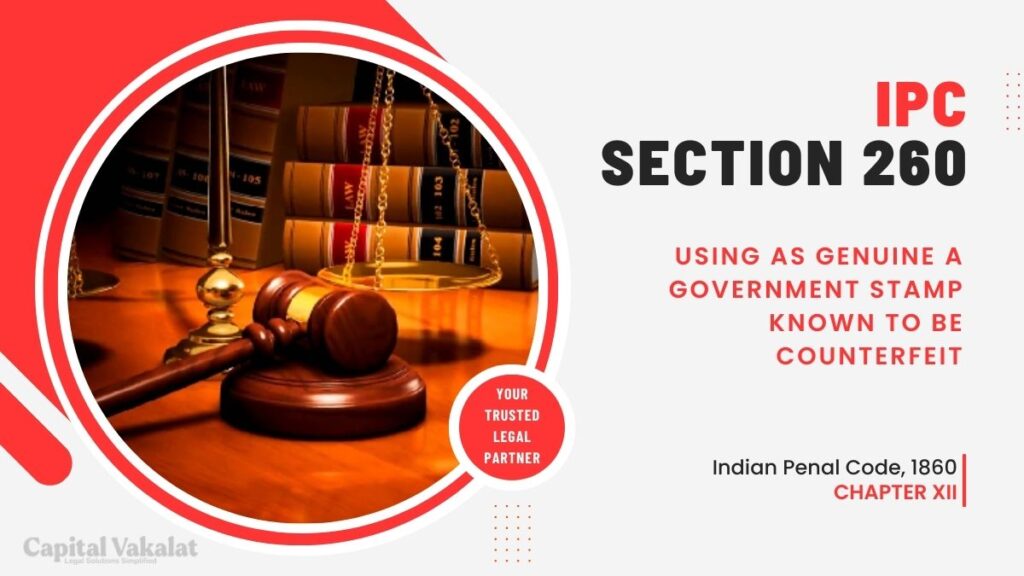In the realm of criminal law in India, Section 260 of the Indian Penal Code (IPC) addresses a specific offense that pertains to the misuse of government stamps. This particular section aims to penalize individuals who knowingly use counterfeit government stamps, passing them off as genuine.

In this article, we will delve into the details of Section 260 IPC, exploring the legal provisions, potential punishments, case studies, implications, and the challenges associated with its enforcement.
Introduction to Section 260 IPC
Section 260 of the IPC is a crucial legal provision that addresses the misuse of government stamps, a matter of great significance in both administrative and legal contexts. This section is in place to deter individuals from using counterfeit government stamps, recognizing the potential harm such actions can inflict on government revenues, public trust, and the overall functioning of official processes.
The Legal Provisions and Offenses
a. Using a counterfeit government stamp
One of the fundamental aspects of Section 260 IPC is the act of using a government stamp that is known to be counterfeit. This offense occurs when an individual knowingly utilizes a forged or fake government stamp, which is meant to represent a legitimate government-issued document.
b. Knowledge of its counterfeit nature
For an offense to fall under Section 260 IPC, it is essential that the accused individual has knowledge of the counterfeit nature of the government stamp. Proving this aspect in a court of law becomes pivotal in establishing guilt.
c. Punishment under Section 260 IPC
The consequences for violating Section 260 can be severe. If found guilty, an individual can face imprisonment, which may extend to two years, or a fine, or both. The quantum of punishment depends on the circumstances of the case and the discretion of the court.
Case Studies and Examples
To understand the practical implications of Section 260 IPC, it’s crucial to explore real-life case studies and examples. These instances highlight the misuse of government stamps and the legal actions taken against the offenders. In many cases, individuals have been penalized for using counterfeit government stamps, demonstrating the seriousness with which the law treats such actions.
Implications and Consequences
The misuse of government stamps, as addressed by Section 260 IPC, has far-reaching consequences. It not only impacts government finances but can also lead to the invalidation of important documents, causing significant legal and administrative challenges.
The Burden of Proof
In cases related to Section 260 IPC, the burden of proof is on the prosecution. It is incumbent upon the prosecution to establish that the accused knowingly used a counterfeit government stamp, along with evidence demonstrating the counterfeit nature of the stamp.
Defenses Available
Individuals accused of violating Section 260 IPC may have certain defenses available to them. These defenses can include lack of knowledge about the counterfeit nature of the stamp or challenges to the evidence presented by the prosecution.
Challenges in Enforcement
The enforcement of Section 260 IPC can pose challenges, especially in cases where proving knowledge of the counterfeit nature is not straightforward. Investigative and legal hurdles may complicate the process of bringing offenders to justice.
Importance of Distinguishing Genuine and Counterfeit Stamps
The ability to distinguish genuine government stamps from counterfeits is essential for both individuals and authorities. This helps in preventing accidental use of counterfeit stamps and strengthens the enforcement of Section 260 IPC.
Recommendations for Compliance
To avoid falling afoul of Section 260 IPC, individuals and organizations should exercise due diligence in verifying the authenticity of government stamps. Implementing internal processes and controls can go a long way in ensuring compliance with the law.
Conclusion
In conclusion, Section 260 IPC serves as a critical safeguard against the misuse of government stamps. The intentional use of counterfeit government stamps undermines the integrity of official documents and processes, and the law treats it as a serious offense. With the potential for imprisonment and fines, understanding and adhering to this legal provision is essential. By ensuring compliance and upholding the integrity of government stamps, we contribute to the efficient functioning of the legal and administrative systems.
Frequently Asked Questions
What is the punishment for violating Section 260 IPC?
The punishment can include imprisonment for up to two years, a fine, or both, depending on the circumstances and the court’s discretion.
How can one defend themselves against allegations under Section 260 IPC?
Defenses may include proving a lack of knowledge about the counterfeit nature of the stamp or challenging the evidence presented by the prosecution.
Why is it important to distinguish genuine and counterfeit government stamps?
Distinguishing between genuine and counterfeit stamps is crucial to prevent accidental use of counterfeits and to uphold the law as specified in Section 260 IPC.
What steps can individuals and organizations take to ensure compliance with Section 260 IPC?
Implementing internal processes and controls to verify the authenticity of government stamps is essential for compliance and legal adherence.